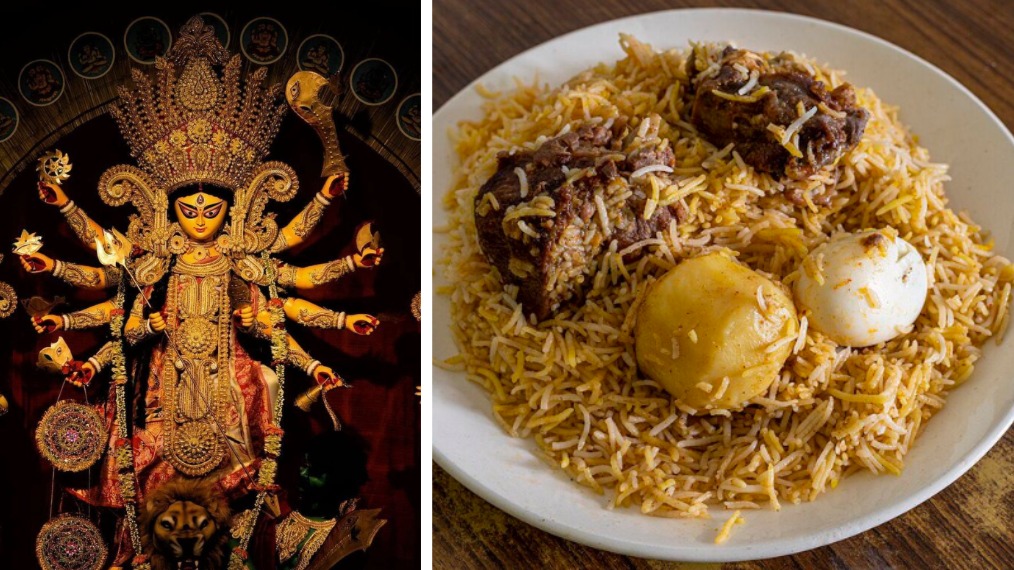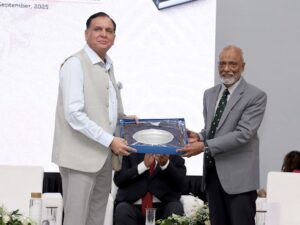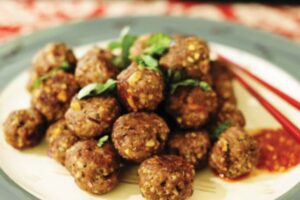Bengali Woman’s Chicken Biryani Post During Navratri Triggers Big Debate on Food and Faith

Bengali Woman’s Chicken Biryani Post During Navratri Triggers Big Debate on Food and Faith
The festive season in India always brings excitement, but this year’s Navratri and Durga Puja celebrations have turned into a heated debate on social media. It all started when Bhopal SDM Divya Patel announced a strict rule: “Navratri will begin tomorrow. In view of this, the sale of meat, fish, and eggs has been banned in the city from September 22 to October 2, 2025.” Though the tweet was quickly deleted, a screenshot spread like wildfire, and people everywhere began talking.
A Bengali Voice and Her Biryani Pride
Soon after, a Bengali woman, Dr. Aratrika Ganguly, retweeted the news and added her own comment: “Meanwhile, this is how we start our Durga Puja. Fortunate to be born in tolerant and inclusive Bengal.” Her words, paired with Bengal’s famous love for chicken biryani and other meat dishes during Durga Puja, made a bold statement. It hinted that while some people avoid meat during Navratri, Bengalis happily enjoy non-vegetarian food as part of their celebrations. This one tweet turned into a lightning rod for a much bigger conversation about food, faith, and culture.
Social Media Backlash Begins
But not everyone found it funny or harmless. A parody account called Bhadralok fired back, accusing her of mocking religious traditions. The account wrote, “Mocking Gujaratis who eat veg during Navaratri only shows your cheap anti-Hindu mindset. Eat whatever you want, but don’t mock the religious sentiments of other ethnicities. Such attributes fit chotolok.” With that, the argument moved beyond one tweet and became a full-blown debate across India.
Meanwhile how we start our Durga Puja👇🏻
— Dr Aratrika Ganguly (@aratrika_g08) September 22, 2025
Fortunate to be born in tolerant and inclusive Bengal. https://t.co/fJInUscc5Z pic.twitter.com/dxJnENQVgP
Navratri vs. Durga Puja: Two Traditions, One Goddess
The strong reactions revealed just how different the two festivals really are, even though both worship the same goddess, Maa Durga. In Gujarat and across much of North India, Navratri is a time of fasting, vegetarian food, and dancing in colorful garba nights. In Bengal, Durga Puja is a giant community celebration filled with art, music, and food. And here food includes fish, chicken, and mutton. Except for Mahashtami, there is no rule about avoiding non-vegetarian food. The difference isn’t about disrespect; it’s about tradition.
How History and Geography Shaped Bengal’s Food
To understand why meat and fish are normal during Durga Puja, you have to look at Bengal’s history and geography. Bengal is full of rivers and fertile land, making fish an everyday part of life for centuries. People there see fish not just as food but as a blessing.
In many Bengali temples, non-vegetarian offerings are made to the goddess, and the cooked meat is shared as prasad. Even Kali puja involves goat sacrifices in some places. This belief that food can be both sacred and celebratory has always been part of Bengal’s culture.
A Sharp Contrast Across India
This is very different from parts of India shaped by Vaishnavite traditions, where vegetarian food is seen as the purest way to show devotion. In states like Uttar Pradesh, Gujarat, and Rajasthan, Navratri fasting means no grains, no onions, no garlic, and certainly no meat. Restaurants even create special Navratri menus with kuttu puris, sabudana khichdi, and paneer-based dishes. Meanwhile, in Bengal, food stalls near Durga Puja pandals proudly sell biryani, fish fry, egg rolls, and mutton curry. For Bengalis, this is not disrespectful, it is festive indulgence.
From vegetarian thalis in Gujarat to steaming plates of mutton curry in Kolkata, the country celebrates the goddess in many flavors, proving that faith and food can take many forms, and all can be equally sacred.
Disclaimer: This article is based on publicly available social media posts. The quotes and opinions mentioned belong to the individuals cited and not to the publication. The aim is to inform readers about an ongoing public debate on cultural food practices during Navratri and Durga Puja, not to take sides or hurt religious or regional sentiments.












